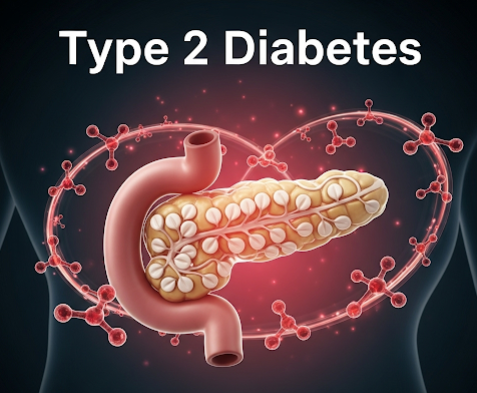Overview
Type 2 Diabetes (T2D) is a chronic metabolic disorder characterized by insulin resistance and progressive pancreatic beta-cell dysfunction, resulting in elevated blood glucose levels. Unlike Type 1 Diabetes, which is autoimmune, T2D is strongly influenced by lifestyle factors, genetics, and environmental conditions. South Korea has experienced a rising prevalence of T2D, largely due to urbanization, dietary changes, and sedentary lifestyles. The country provides advanced diagnostic tools, individualized medication plans, nutrition and lifestyle interventions, and specialized diabetes management programs to prevent complications and optimize long-term health outcomes.
What is Type 2 Diabetes?
Type 2 Diabetes is a condition in which the body cannot effectively use insulin, a hormone responsible for transporting glucose into cells for energy. Initially, the pancreas compensates by producing more insulin, but over time, beta cells become exhausted, leading to persistent hyperglycemia. T2D often develops gradually and may remain undiagnosed for years. In South Korea, routine health screenings and community-based programs help identify T2D early, enabling timely intervention.
T2D can be classified based on clinical features:
- Obese-associated T2D: Linked to excess body weight and metabolic syndrome
- Non-obese T2D: More common in some Asian populations, often with impaired beta-cell function rather than insulin resistance
- Latent autoimmune diabetes in adults (LADA): A slower-progressing autoimmune form with overlapping features
Symptoms
Symptoms of Type 2 Diabetes often develop slowly and may be subtle, including:
- Increased thirst (polydipsia) and frequent urination (polyuria)
- Unexplained fatigue and weakness
- Blurred vision
- Slow-healing wounds or frequent infections
- Numbness or tingling in hands or feet (neuropathy)
- Unintentional weight loss or gain
- Skin changes such as darkened patches (acanthosis nigricans)
Many patients are diagnosed during routine health screenings in South Korea before noticeable symptoms appear, emphasizing the importance of early detection.
Causes
Type 2 Diabetes is caused by a combination of insulin resistance and beta-cell dysfunction. Major contributing factors include:
- Genetic predisposition: Family history increases susceptibility
- Obesity and central fat accumulation: Excess visceral fat contributes to insulin resistance
- Sedentary lifestyle: Physical inactivity reduces glucose utilization and insulin sensitivity
- Dietary factors: High intake of refined sugars, saturated fats, and processed foods
- Age: Risk increases with age, particularly after 40 years
- Hormonal disorders: Conditions such as polycystic ovary syndrome (PCOS) increase risk
South Korean research emphasizes the interplay of genetics, lifestyle, and environmental factors in the rising prevalence of T2D.
Risk Factors
Several factors increase the likelihood of developing T2D:
- Overweight or obesity, particularly abdominal obesity
- Sedentary lifestyle or lack of regular exercise
- Family history of diabetes
- Hypertension, dyslipidemia, or metabolic syndrome
- Smoking and excessive alcohol consumption
- Age over 40 years, with increased risk in older adults
- History of gestational diabetes or large birth weight babies in women
Korean public health initiatives focus on lifestyle modification, weight management, and preventive screening in high-risk populations.
Complications
Uncontrolled Type 2 Diabetes can result in serious acute and chronic complications:
- Cardiovascular disease: Heart attacks, strokes, and peripheral artery disease
- Kidney disease (diabetic nephropathy): Progressive renal dysfunction potentially leading to dialysis
- Neuropathy: Nerve damage causing pain, tingling, or loss of sensation, particularly in the feet
- Retinopathy: Eye damage leading to vision loss or blindness
- Skin infections and slow wound healing
- Diabetic foot ulcers: Can lead to amputation if severe
- Cognitive decline and dementia: Increased risk in long-standing diabetes
- Hypoglycemia and hyperglycemia: Acute metabolic disturbances if treatment is not properly managed
South Korean healthcare emphasizes early detection, glycemic control, and routine monitoring to prevent these complications.
Prevention
Type 2 Diabetes can often be prevented or delayed through lifestyle interventions and health monitoring:
- Regular physical activity: At least 150 minutes of moderate exercise per week
- Healthy diet: Emphasizing whole grains, vegetables, lean protein, and reduced sugar and saturated fats
- Weight management: Achieving and maintaining a healthy body weight
- Regular health screenings: Blood glucose, HbA1c, and blood pressure checks
- Smoking cessation and moderation of alcohol intake
- Stress management: Incorporating relaxation techniques, sleep hygiene, and mental health support
Public health programs in South Korea target diet, exercise, and awareness campaigns to reduce T2D incidence.
Treatment Options in Korea
Management of Type 2 Diabetes in South Korea is comprehensive, combining lifestyle modification, medication, and ongoing monitoring:
Diagnosis:
- Fasting blood glucose and oral glucose tolerance tests
- HbA1c measurement for long-term glucose control
- Lipid profile and kidney function tests to assess complications
- Periodic eye exams and neuropathy assessments
Medical Treatments:
- Oral medications: Metformin, sulfonylureas, DPP-4 inhibitors, SGLT2 inhibitors
- Insulin therapy: For patients with advanced beta-cell dysfunction or uncontrolled hyperglycemia
- Combination therapies: Tailored regimens combining multiple agents for optimal glycemic control
Lifestyle and Supportive Care:
- Structured diet plans by nutritionists, including culturally appropriate Korean meals
- Exercise programs and physical therapy guidance
- Diabetes self-management education programs
- Monitoring for early signs of complications and prompt referral to specialists
Advanced Interventions:
- Continuous glucose monitoring and digital health platforms for real-time glucose tracking
- Bariatric surgery in selected obese patients to improve insulin sensitivity and glycemic control
- Multidisciplinary care teams involving endocrinologists, dietitians, and diabetes educators
South Korea’s integrated approach emphasizes patient education, personalized treatment, and regular follow-up to prevent complications and maintain long-term metabolic health.













